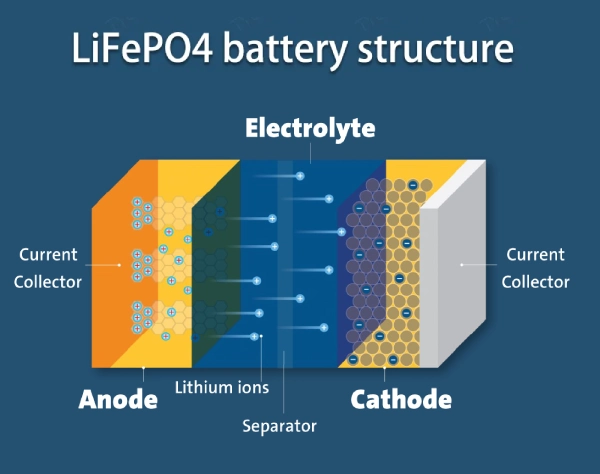Part 1: Structure and Principle of a LiFePO4 Battery

1. Structure of a LiFePO4 Battery
A LiFePO4 battery consists of several key components: a positive electrode, a negative electrode, an electrolyte, a separator, leads for both electrodes, a center terminal, a safety valve, a sealing ring, and a casing.
- Positive Electrode (Cathode): This is typically made of lithium iron phosphate (LiFePO4) with an olivine structure. It’s connected to the battery’s positive terminal via aluminum foil.
- Separator: The separator is a polymer membrane that separates the positive and negative electrodes. It allows lithium ions (Li⁺) to pass through but prevents electrons (e⁻) from crossing.
- Negative Electrode (Anode): Usually made of carbon (graphite) and connected to the battery’s negative terminal using copper foil.
The structure of the LiFePO4 material provides high stability and safety but relatively low conductivity, which affects the battery’s performance and efficiency.
2. Working Principle of a LiFePO4 Battery
- Charging Process: During charging, lithium ions move from the LiFePO4 cathode to the graphite anode through the electrolyte and separator. Electrons travel through the external circuit to balance the charge, resulting in the conversion of LiFePO4 into iron phosphate.
- Discharging Process: During discharging, lithium ions move from the graphite anode back to the LiFePO4 cathode. This process releases energy as the ions return to their original position in the lattice structure of the LiFePO4 material.
Part 2: Charging LiFePO4 Batteries
The recommended method for charging a LiFePO4 battery pack is the CCCV (Constant Current, Constant Voltage) approach:
- Constant Current: Charge the battery at a rate of 0.3C.
- Constant Voltage: Once the battery reaches 3.65V per cell, switch to constant voltage charging.
Important Points to Note:
- The nominal voltage of LiFePO4 batteries is 3.2V, with a maximum charging voltage of 3.6V.
- Unlike traditional lithium-ion batteries, which have a charging cutoff voltage of 4.2V, LiFePO4 batteries have a lower cutoff voltage.
Charging with Solar Panels: Solar panels cannot directly charge LiFePO4 batteries due to their unstable voltage output. A voltage regulator and a suitable charging circuit are necessary.
Charging with Generators: Similarly, generators cannot directly charge LiFePO4 batteries, as they produce either AC or pulsed DC power. Regulated DC power is required for safe charging.

Part 3: Discharging LiFePO4 Batteries
To safely discharge a LiFePO4 battery, follow these steps:
- Determine the Safe Discharge Rate: The recommended discharge rate for LiFePO4 batteries is typically between 1C and 3C.
- Connect the Load: Ensure secure connections with the correct polarity.
- Monitor the Voltage: Use a voltmeter to ensure the voltage does not drop below 2.5V per cell.
- Discharge at the Recommended Rate: If the battery gets hot, reduce the discharge rate to avoid damage.
- Stop at the Right Time: Discharge should be stopped when the battery reaches 2.5V per cell.
- Proper Storage: Store the battery at about 50% charge in a cool, dry place.
Part 4: Extending the Life of a LiFePO4 Battery
To maximize the lifespan of your LiFePO4 battery, consider these tips:
- Avoid Overcharging and Overdischarging: Keep the battery’s charge between 40% and 80% to slow down the aging process.
- Control Charging Time: Avoid leaving the battery on the charger for too long and use chargers that meet the battery’s specifications.
- Clean the Battery Regularly: Keep the battery free of dust and debris.
- Avoid Extreme Temperatures: Store and operate the battery in environments between 5°C and 35°C.
- Prevent Physical Damage: Avoid crushing or dropping the battery to prevent internal damage.
- Regular Maintenance: Check connections, clean terminals, and ensure the battery is properly maintained.
- Use a Dedicated Charger: Use a charger specifically designed for LiFePO4 batteries to ensure compatibility.
Part 5: Recommended LiFePO4 Charging Currents
Charging current recommendations for LiFePO4 batteries can vary but generally follow these guidelines:
- Standard Charging Current: 0.2C to 1C (e.g., for a 100Ah battery, 20A to 100A).
- Fast Charging Current: 1C to 3C (e.g., for a 100Ah battery, 100A to 300A).
- Balancing Charging: 0.1C to 0.2C (e.g., for a 100Ah battery, 10A to 20A).
- Trickle Charging: 0.01C to 0.05C (e.g., for a 100Ah battery, 1A to 5A).
Part 6: LiFePO4 Battery Pack Charging Methods
- Constant Voltage Charging: Maintains a steady voltage during charging, but it isn’t often used due to its potential for causing damage at high currents.
- Constant Current Charging: Maintains a consistent charging current, though less efficient in the later stages of charging.
- Constant Current and Constant Voltage (CCCV) Charging: Combines the benefits of both methods, using constant current initially and switching to constant voltage as the battery approaches full charge.
- Chopping Charge: Uses intermittent charging to give the battery time to stabilize, improving charging efficiency.
Each of these methods has its own advantages, but CCCV charging is most commonly recommended for LiFePO4 batteries due to its balance of safety and efficiency.
